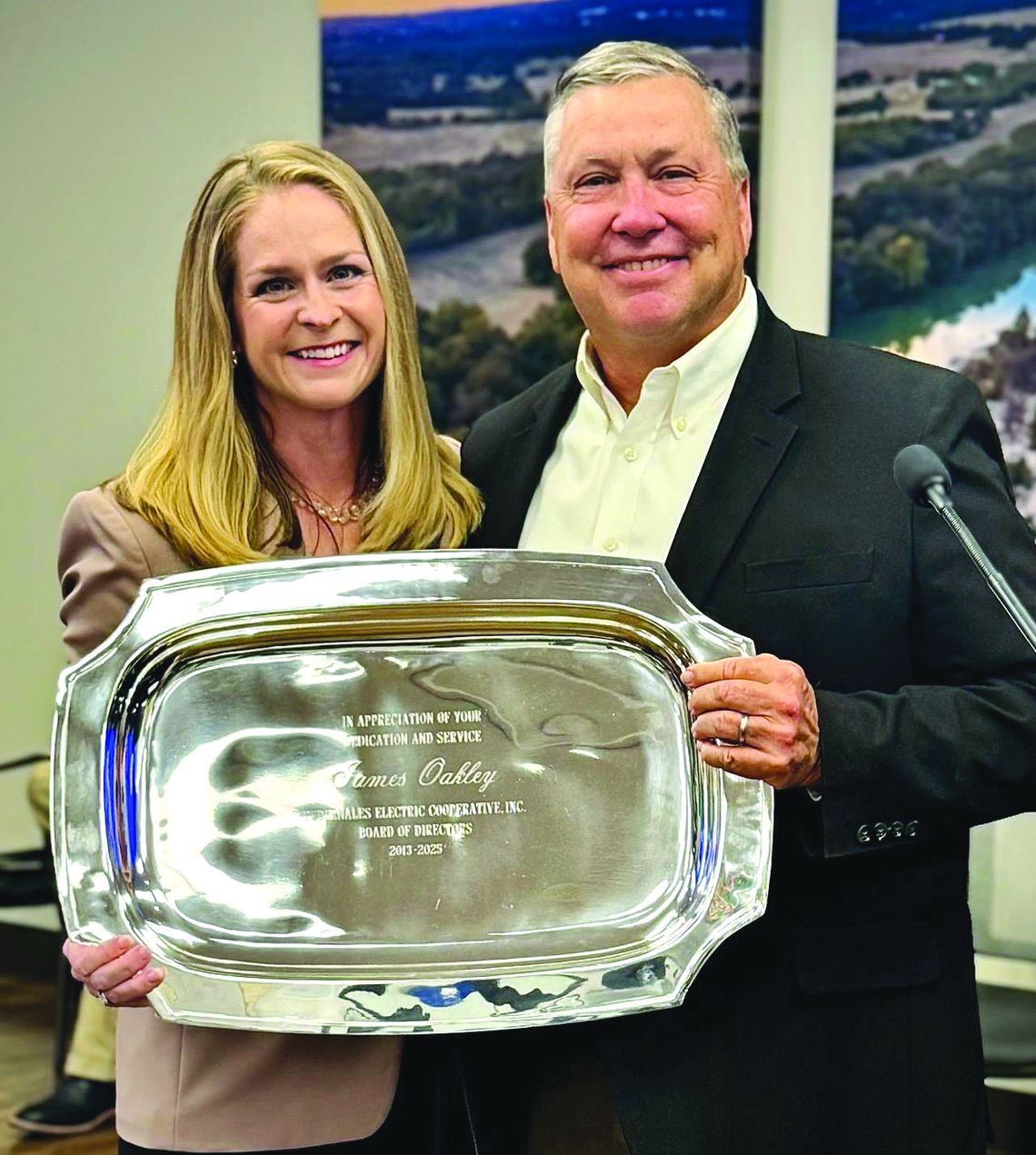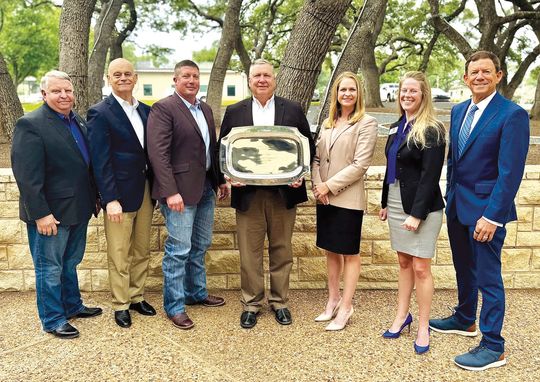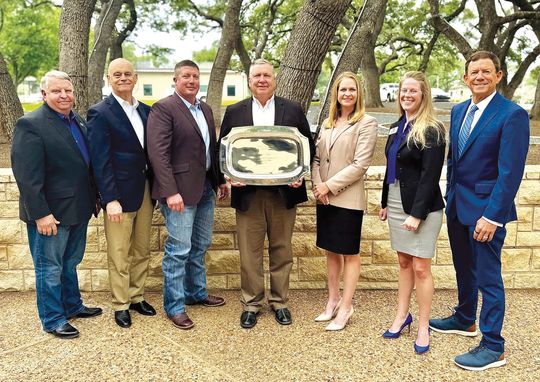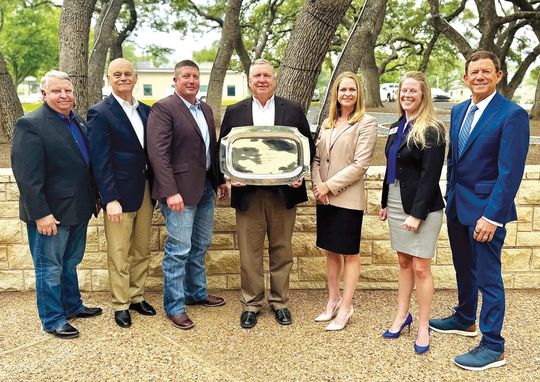Outgoing District 5 Director James Oakley, first elected in June 2013 to the Pedernales Electric Cooperative Board, bid farewell to the PEC family on May 16.
In 2025, he could not run for re-election due to term limits. The by-laws call for four, three-year terms. This coming June marked 12 years of service and the first time a director has term limited since reforms were made in the 1990s.
At the PEC general meeting, board president Emily Pataki read and the board adopted a resolution into the record, expressing “great appreciation and commemoration” on behalf of the directors for Oakley’s time on the board.
“The members, employees and board of directors of Pedernales Cooperative of Johnson City, Texas, celebrate the contribution of their esteemed colleague and friend, retiring director James Oakley,” she stated at the meeting. “James Oakley faithfully and capably served as director for District 5.
“He endeavored to responsibly shape the leadership and governance … ensuring sound business practices and strong stewardship of fiscal resources.”
Among his accomplishments, along with serving as president of the board for a year, included streamlining officer/ staff preparation protocols prior to board meetings. He also spearheaded single- member district voting and helped guide a $1 billion operating budget. During his last meeting, his fellow directors celebrated his dedication and commitment to the cooperative.
Oakley, who represented Burnet County residents among his service area, shared his insights with The Highlander about the past, present and future of the utility.
Q: What are you most proud of?
A: “I’m proud to have brought, from a local government perspective, to the organization’s board leadership to amend some of the operating by-laws.
“The amendments don’t 100% mimic local government but has added to the transparency in some of the process of working with the members just as if it was the public.”
Q: What were the most dramatic changes you saw during your tenure?
A: “Bringing on the SmartHub applications where you can view all kinds of interactions on your mobile device, view your account, get notifications, all the streamlining of the bill payments, the interactions with the membership.”
Q: What are your thoughts about the staff?
A: “First and foremost, the guys in blue, the linemen, who get out in a moment’s notice out in the storms, get the power back on – either natural disasters or vehicle collisions when the poles have been knocked over. I can’t say enough good things about them.
“They wouldn’t be what they are if it wasn’t for all the support staff, all the member services folks. Everybody comes together. Each is a spoke of a big wheel that makes it turn smoothly. As far as the directors, each is great in their own way.”
Q: What stands out to you about PEC leadership?
A: “We have Julie Parsley in place. She’s got a wealth of experience with the legislature, and she’s an attorney. PEC was recognized as being one of the top employers in the nation. PEC is a large organization.
“It has doubled in size (225,000 to 427,000 members) since I started on the board as far as number of meters. It’s the nation’s largest cooperative. It’s the fastest-growing as well. It grows more each year than the average co-op in the United States.
“I’m happy to have managed that growth, leveraging capital outlay, keeping rates in the bottom quartile of electric providers in Central Texas. That says something when you can be competitive that way.”
Q: What were some activities you spearheaded as a director?
A: “Single-member districts. That’s one of the things that before single- member districts I felt was not equitable with the board elections. Back in 2013 when I ran you had to get petition signatures from just your geographic district, but then all districts got to vote on that representation.
“There wasn’t another parallel like that. Once more like-minded folks got elected to the board, that became an obvious thing that we needed to change.
“What was happening is you had an urban influence that could out-vote the rural representative. That’s not an equitable formula.”
Q: How will technology play a role for co-op members?
A: “The future is only going to enhance abilities for people to manage their accounts. They can basically be able to look in live time at what their meter usage is and predict what their bill’s going to be.
“They can monitor their account much closer. PEC just adopted a new enterprise software system that’s going to allow for that.
“While I embrace a lot of the technological changes, one of the things that I strived for was the ability to acknowledge the old timers out on the farm, who wanted to come in and pay their bill, talk with the agents, make a cup of coffee.
“I didn’t want to let go of the old-fashioned personal touch of customer service, and I think PEC has a good combination in place of that now. Although it may seem more efficient to do everything automated, there’s still a part of the membership, generationally, that don’t embrace all that technology.
Q: What does the future of power look like?
“While PEC is purely a distribution co-op that also has some transmission growth that will continue to grow. As we have more and more demands on the grid – be it from electric cars, be it from growth, new houses, data centers – I think in the energy industry, we need to make sure we have good reliable core horsepower available to the grid.
“While renewables are great, you can use them in certain times when conditions are good for that, you still have to have that core that you can balance on.
“There’s a lot of about micro-nuclear plants that are popping up around the nation. That’s an emerging technology.
“We need to make sure that our environmental laws that govern coal-fired plants and fossil fuel-related generation sources, we need to make sure the red tape is transparent and evenly applied and there’s responsible rules but not anything that’s an obstacle. We should never have to worry about the capacity of the grid in Texas.”
During his stint on the PEC board, Oakley’s service overlapped simultaneously from 2013-18 as the Burnet County judge as well as on the Texas Commission on Law Enforcement, Capital Area Council of Governments and Capital Area Metropolitan Planning Organization.
Oakley revealed that the secrets to his success and longevity included, “Remembering the role you play with that organization, and don’t get beyond that. Stick to the important matters and work well with others that tasks have been delegated to.”
At the final PEC meeting, he expressed “fond memories” and thanked his fellow directors for the “honor” of being a part of PEC. He was presented with an inscribed silver platter and given a standing ovation.
On his service at PEC as well as other positions, he expressed to The Highlander: “Because these are elected positions by the people, it occurred that’s what I ought to be doing.
“Making things happen,” Oakley said. “If you’re going to do something, do it right. That’s the way I was raised. I enjoyed it.”
















